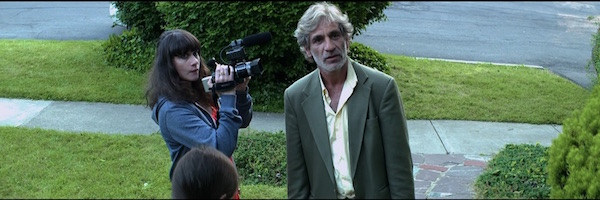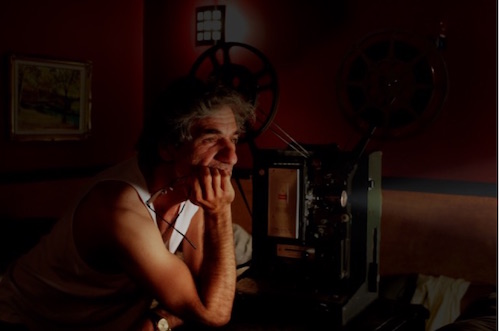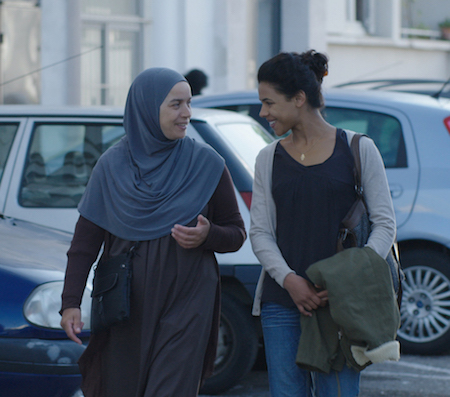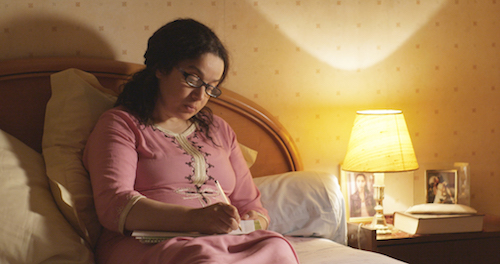Two Takes on Love
Is That You? and Fatima, both opening on Friday, explore different kinds of love in very different ways. The first film follows a middle-aged man’s attempt to rekindle a past relationship; the second is a look at an struggling immigrant’s devotion to her children.
“Dear Rachel: Is that you?,” writes Ronnie (a soulful Alon Aboutboul) to an ex-girlfriend he knew 30 years ago. Though they haven’t been in touch since she left their native Israel for the United States, he thinks about her often. So when he’s fired from his projectionist job and is compensated with plane ticket to America, Ronnie’s path is laid out for him.
Is That You?, from Israeli filmmaker Dani Menkin (Dolphin Boy, 39 Pounds of Love), is an off-beat drama that makes up for its somewhat ramshackle quality and quirk overload with genuine warmth and nice performances from its leads. Though its motif about trying to reconnect with the past gets a bit repetitive at times, Is That You? is a poetic, not altogether predictable meditation on the theme, an admirable achievement in itself.
When Ronnie arrives in upstate New York, he stays with his outgoing car salesman brother, Jacob (Rani Bleier). Coincidentally, Jacob has recently run into Rachel (Suzanne Sadler), who asked about Ronnie. With the help of Jacob’s son, they find several women named Rachel Golan on Facebook and narrow down Ronnie’s search. The couple once made a pact to be together on her 60th birthday, which happens to be in two days. Jacob gives Ronnie a car and the advice, “Sometimes there are dreams against all logic; you just have to make them happen.”
After an unfruitful visit to Rachel’s old address, Ronnie’s car breaks down. A pixieish young woman named Myla (Naruna Kaplan de Macedo) agrees to help him if she can include him in the documentary she is making about regrets called The Road Not Taken (yes, coincidences abound). He reluctantly agrees and the two pursue several false leads, making a stop at one point to visit Myla’s ailing grandmother, who mistakes Ronnie for someone she once knew, asking him, “Is that you?” Along the way, Myla interviews everyone they encounter, including a cop who pulls them over on the highway. The resulting footage of regular folks speaking honestly about their lives provides some nice interludes.
As their road trip continues, Ronnie and Myla’s odd friendship becomes almost uncomfortably affectionate, until we realize it has taken on a father-daughter dynamic. This is confirmed by the revelation of Myla’s personal reasons for making The Road Not Taken, after the two spend an evening drinking at a motel pool.
Though the last part of the film is a bit drawn out, it is also the most moving, as Ronnie finds what he’s looking for (as does Myla). It’s a satisfying conclusion to a good-hearted film that tackles an issue we’ve all pondered at some point and dares to provide a solid outcome.
—————————————————————————————————————————————
A low-key, slice-of-life movie, Philippe Faucon’s Fatima charts the travails of a divorced, Algerian mother of two teenage daughters living in Lyon, France. Based on Fatima Elayoubi’s collection of autobiographical poems, Fatima stars Soria Zeroual as its stoic title character, a hard-working immigrant who is unwavering in her devotion to studious older daughter Nesrine (Zita Hanrot) and the rebellious Souad (Kenza-Noah Aïche), despite various frustrations. A series of naturalistic vignettes show the escalating struggles and hard-won victories of these characters; it makes for a compelling narrative.
Early in the film, we see the family dynamic in conversations between Fatima and her daughters: she speaks Arabic and they answer in French. The girls (especially Souad) are acclimated to western life, while the headscarf-wearing Fatima struggles with the language and culture, as well as criticisms from fellow North African women who resent the fact that Nesrine attends college. To support her daughter’s medical studies, Fatima cleans the apartment of a French woman, in addition to her regular job cleaning commercial spaces. Though her employer seems fair enough, Fatima believes the woman is testing her by leaving money unattended. In an earlier incident involving apartment-hunting with Nesrine, Fatima likewise suspected discrimination. As in real life, the answer isn’t always clear.
The girls’ westernized father, who has remarried, sees them occasionally but is nowhere as involved as Fatima. As the film progresses, arguments escalate between Fatima and the sullen, smart-alecky Souad, with mother warning daughter to cover up and be more careful, so as not to cause talk. Ironically, it’s the more conservative, hard-working Nesrine who is the brunt of gossip among Fatima’s acquaintances.
After a frustrating parent-teacher meeting, Fatima admits to a co-worker that she feels inadequate due to her limited education. She enrolls in a French class and soon begins speaking the language at home and communicating more to her employer. Meanwhile, Nesrine struggles both with her studies and neighbors who accuse her of snubbing them. A nice-seeming boy flirts with her on the bus but, unlike Souad, she spurns male attention, until her ever-perceptive mother counsels otherwise. As her own stresses build, Fatima describes her life in increasingly poetic entries she writes in a notebook, clearly a crucial outlet.
Things come to a head as Souad blows up at her mother, Nesrine breaks down over the strain of her studies and the distracted Fatima sustains an injury. Eventually, she finds comfort in a young female doctor to whom she reads one of her poems in its entirety. It’s a surprisingly poignant moment in this straightforward film, which makes it all the more powerful.
Is That You? opens Friday at Cinema Village; Fatima opens Friday at the Film Society of Lincoln Center.
—Marina Zogbi





